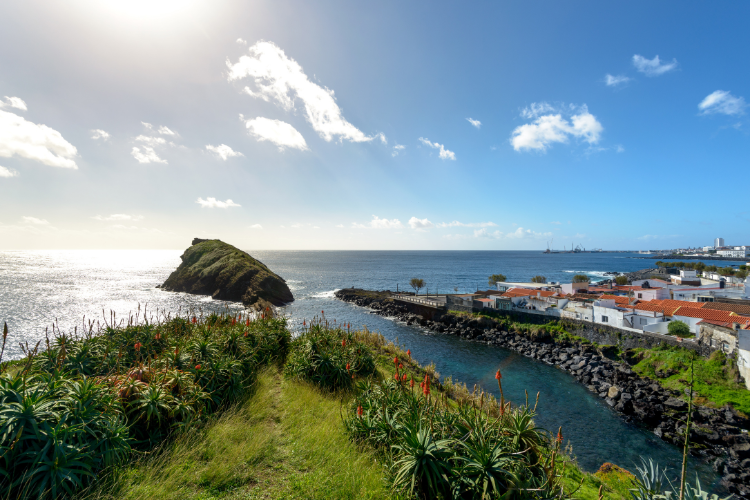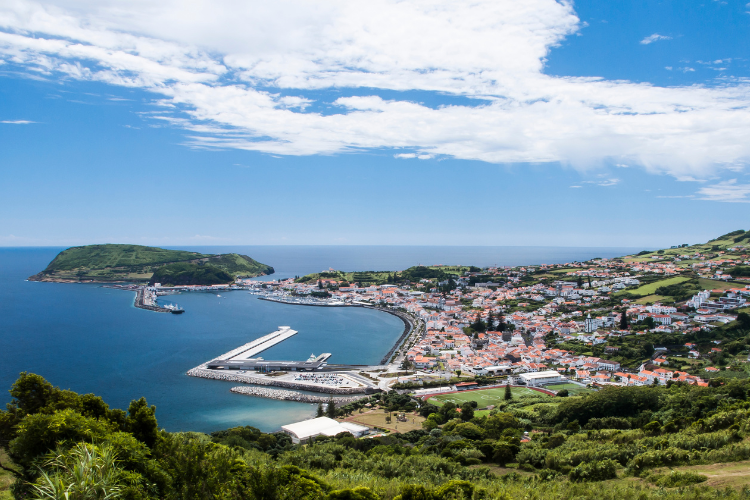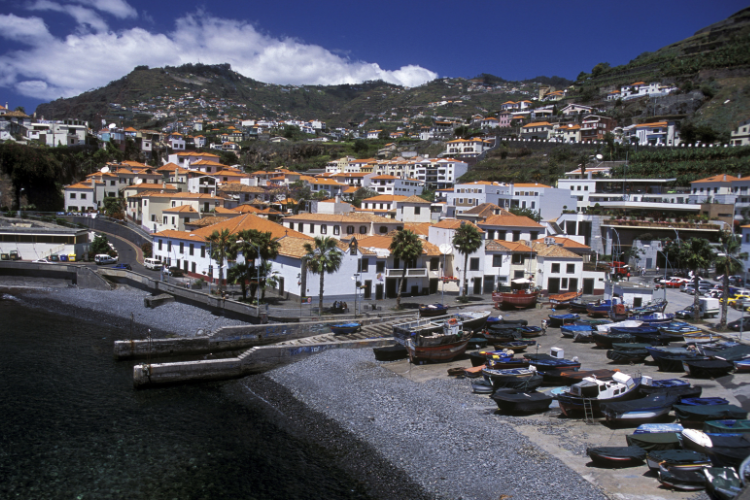Last Updated on December 5, 2024 by Maryam Siddiqui
As an expat, selecting the right destination involves carefully considering various factors, including lifestyle, climate, cost of living, and amenities. Two enchanting archipelagos nestled in the Atlantic Ocean beckon expats with their unique charm and distinct offerings. So, is comparing Madeira vs Azores Islands a fair comparison?

Both locations boast breathtaking landscapes, vibrant cultures, and a welcoming atmosphere. In this post, we delve into the nuances of Madeira and the Azores Islands, aiming to guide expats through the decision-making process. In the process, we will help you determine which destination aligns better with your individual preferences and aspirations.
Join us as we embark on a journey to compare Madeira vs Azores Islands, seeking to unravel the mysteries of these captivating locales and assisting you in finding the perfect place to call home. Happy reading!
The Portuguese Islands
Portugal owns two archipelagos: the Azores and Madeira. The Azores archipelago, located in the North Atlantic Ocean, consists of nine major islands. These islands are São Miguel, Terceira, Pico, Faial, São Jorge, Santa Maria, Graciosa, Flores, and Corvo.
The Madeira archipelago, situated in the Atlantic Ocean closer to the northwest coast of Africa, includes the main islands of Madeira and Porto Santo, along with smaller uninhabited islands.
Madeira Islands
It is the largest and most populous island, where the capital city, Funchal, is located. The capital of Madeira is a vibrant city with historical sites, museums, and a lively atmosphere. Madeira has a subtropical climate with mild temperatures throughout the year, making it a popular destination for expats seeking a pleasant environment.
Unlike inland Portugal, Madeira has a rich cultural heritage influenced by Portuguese, African, and Moorish traditions. This foreign influence is quite evident in the local cuisine on the island. It features seafood, traditional dishes like espetada (skewered meat), bolo do caco (a type of bread), and the famous Madeira wine.
Tourism is one of the main draws for tourists and expats to this island. Madeira is popular for many activities, including:
- Wine tasting;
- Whale and dolphin watching;
- Hiking;
- Canyoning;
- Funchal’s old town and markets;
- Sailing and Boat Tours.
Their stunning landscapes, pleasant climate, and unique blend of cultures make them a popular destination for nature lovers.
- Read our article Living In Madeira: All Expats Need To Know About Life On The Island.
Azores Islands
As mentioned earlier, the Azores Islands are nine islands divided into three groups: the Eastern Group (São Miguel and Santa Maria), the Central Group (Terceira, Graciosa, São Jorge, Pico, and Faial), and the Western Group (Flores and Corvo).
Different from Madeira islands, the Azores are of volcanic origin, and rugged landscapes, volcanic craters, and lush greenery characterize the islands.
The climate in the Azores is temperate and oceanic, with mild temperatures throughout the year. The Atlantic Ocean can influence the weather, resulting in frequent rain and moderate temperatures.
The islands’ natural beauty, with volcanic craters, hot springs, and stunning coastal landscapes, attracts expats seeking adventure and relaxation. The Azores offer a variety of outdoor activities, including hiking, trekking, whale watching, bird watching, and water sports like scuba diving and surfing.
Note that the Azores is designated a UNESCO Biosphere Reserve, recognizing the islands’ commitment to sustainable development and preserving their unique ecosystems.
- Read our article Living In The Azores: An Expat Guide To The Portuguese Islands.
What is it like living in Madeira vs the Azores?
Life on an island is often very different from living on the mainland, and the same is true for the islands of Madeira and Azores. So what is it like living in Maderia vs Azores?
Let’s begin with the similarities: these two islands offer a more relaxed and laid-back lifestyle than mainland Portugal. The small island communities often foster a strong sense of community and a slower pace of life. This makes it easier to integrate into the communities than the big cities on the mainland.
Another similarity is that you can enjoy various outdoor activities, including hiking, water sports, and exploring natural wonders regardless of the island.
The main difference between these two islands is the climate. While Madeira experiences relatively consistent weather characterized by mild winters and warm summers, the Azores islands are often influenced by the ocean.
Madeira tends to have slightly higher living costs than the Azores regarding groceries, transportation, and leisure activities. However, dining out in Funchal is generally more affordable than in Ponta Delgada (via Numbeo).

- Looking to relocate with your family? Check out the Best International Schools In Madeira!
Proximity to Lisbon and Porto
Given that Madeira and the Azores are islands, they are miles away from Lisbon and Porto, the two major cities in mainland Portugal. Madeira is located in the Atlantic Ocean, approximately 1,000 km (621 miles) southwest of Lisbon. Travel time by air from Lisbon to Madeira is around 3 hours.
The Azores islands are situated farther west in the Atlantic Ocean, approximately 1,400 km (870 miles) west of Lisbon. Travel time by air from Lisbon to the Azores is around 2 to 3 hours, depending on the specific island.
Both Madeira and the Azores are accessible by air, but the travel time to the Azores is generally shorter. This might make the Azores a more convenient option for expats seeking a quicker getaway from Lisbon or Porto.
While both Madeira and the Azores are accessible from Lisbon and Porto, the Azores are generally closer.
- Check out Viv Europe’s exclusive interview: Living Abroad: A Digital Nomad Interview with Katie Dillon!
Culture and history in Madeira vs Azores
Portugal is known to have a rich culture and plenty of history. Although Madeira and the Azores are islands, they share much Portuguese history and culture.
Regarding history, Madeira was officially discovered in 1419 by Portuguese explorers João Gonçalves Zarco, Tristão Vaz Teixeira, and Bartolomeu Perestrelo.
Conversely, the Azores were discovered in the 15th century during the Age of Discovery. Portuguese navigators, led by Gonçalo Velho Cabral, are credited with the discovery.
Madeira’s cultural heritage reflects its colonial past and the influence of various cultures. Portuguese, African, and Moorish elements shape the architecture, traditions, and local festivities. Madeira hosts vibrant festivals throughout the year, including the Funchal Carnival and the Madeira Wine Festival. These events celebrate the island’s cultural identity, traditions, and gastronomy.
The Azores are known for their religious festivals, with each island celebrating its patron saint. These festivals often include processions, music, and traditional dance.
One commonality between these two islands is that both archipelagos share a sense of island living, with communities that often foster a strong sense of identity and belonging.
Also, Madeira and the Azores actively work to preserve their cultural heritage, which is evident in their UNESCO designations (Madeira’s Laurisilva Forest and Levadas; Azores’ Biosphere Reserve).
Cost of living in Madeira vs Azores
Generally, the cost of living in Portugal is cheaper than in most European countries or beyond. The good news is that both the Azores and Madeira are no different. In fact, the cost of living on these two islands is slightly lower than on the mainland.
While this is true, the cost of living can vary based on factors such as accommodation, food, transportation, and lifestyle choices. It’s important to note that living costs are subjective and depend on individual preferences and circumstances.
But what is the actual cost of living in Madeira vs Azores? Here are two articles about the individual cost of living in Madeira and the Azores.
Property Ownership
Ownership in the Azores and Madeira follows the same legal framework as property ownership in mainland Portugal, as both archipelagos are autonomous regions of Portugal.
Fortunately, Portugal has a welcoming policy for international property ownership; expats can buy and own property. The cost of buying property in Madeira is €2,924 per square meter, while in the Azores, it is €1,387.
An excellent scheme to encourage property ownership in Madeira or the Azores was the prospect of qualifying for a Golden Visa.
The Golden Visa program allows non-EU citizens to obtain residency in Portugal by making qualifying investments. Unfortunately, as of January 2024, real estate acquisition is no longer an option. But you can still qualify for the Golden Visa Through Investment Funds!
Nonetheless, you can buy property without applying for the Golden Visa too.
Let’s Move to Europe
With Viv Europe your plans for Europe will come to a reality
- Compare what it’s like Finding A Rental In Madeira and Finding A Rental In The Azores!
Digital Nomadism
Madeira and the Azores are popular destinations for digital nomads due to their natural beauty, pleasant climates, and efforts to attract remote workers.
While this is true, Madeira is often more popular than the Azores regarding digital nomadism for a few reasons. First, Madeira has good internet connectivity, particularly in urban areas and tourist hubs.
The capital city, Funchal, and other major towns offer reliable high-speed internet. Connectivity in the Azores can vary by island. Larger islands like São Miguel have better internet infrastructure, while smaller and more remote islands may have more limited options.
The digital nomad community in Madeira is growing thanks to the D8 Digital Nomad Visa. As a result, events and meetups organized by local and expat communities are also increasing. Networking opportunities can be found in coworking spaces and social events.
The digital nomad community in the Azores may be smaller, but there are a few coworking spaces that you can still make good use of.
- Similar Article: Digital Nomads Guide To Live In Madeira Islands.
Transportation
Transportation in Madeira and the Azores involves a combination of air travel, inter-island ferry services, and local transportation within each island. Public buses and taxis are common modes of transportation within Madeira.
Funchal, in particular, has a well-organized bus system connecting different parts of the city.
Public transportation varies between islands in the Azores. Larger islands like São Miguel may have more developed bus services, while smaller islands may have limited public transportation options. Lastly, inter-island ferry services are available in the Azores, connecting certain islands.
Flights from cities
Madeira is served by Madeira International Airport (Cristiano Ronaldo International Airport) in Funchal, the capital. The airport has regular flights to and from mainland Portugal and other European cities.
Each island in the Azores has its own airport, with international flights connecting São Miguel, Terceira, and Faial to mainland Portugal and other destinations.
Inter-island flights are available. Azores Airlines (SATA) operates inter-island flights, providing convenient travel between islands.
Weather
While both islands have favorable weather, it is the one thing that distinguishes Madeira vs the Azores. As mentioned earlier, Madeira has a subtropical climate with mild yearly temperatures.
This makes it a popular destination for those seeking a consistent and pleasant climate. Winters in Madeira are mild, with average temperatures rarely dropping below 15°C (59°F).
Summers are warm but not excessively hot, with average highs around 25°C to 30°C (77°F to 86°F), per Climate Data. Also, Madeira receives precipitation throughout the year but is distributed unevenly.
The northern and mountainous areas tend to be wetter, while the southern and coastal regions are drier.
The Azores islands are a bit different; these islands experience a temperate oceanic climate influenced by the Gulf Stream. The climate is generally milder than mainland Portugal but can be more changeable.
Winters in the Azores are mild, with temperatures rarely falling below 10°C (50°F). Summers are also moderate, with average highs around 25°C to 30°C (77°F to 86°F), per Climate Data.
The Azores experience more variability in weather conditions compared to Madeira. It is not uncommon to have rain showers followed by sunshine on the same day.
Rainfall is spread throughout the year, with a tendency for wetter conditions in the winter months. The northern and western islands generally receive more precipitation.
Safety
In case you didn’t know, Portugal is ranked seventh-safest by the Global Peace Index 2023. That’s one reason the islands have become a hotspot for expat retirees. Out of all the things that could happen to you on the Azores, hate crimes aren’t one of them.
Expats in the Azores live in utmost peace and relaxation. Rest assured, you’ll be safe even if you’re a digital nomad living alone.
The same is also true for Madeira. Whether you’re a solo traveler or spending the summer break with your family, you will be safe. Nonetheless, it’s always better to be vigilant, never leave your belongings (and drinks) unattended, and know your way back home.
Unfortunately, as with all tourist destinations, pickpocketing and taxi-fare scams can be possible. So, keeping your belongings near and double-checking taxi meters is best.

Food
Regarding cuisine, the distinctive microclimates of the Azores enable the cultivation of ingredients rarely found elsewhere in Europe, including tropical fruits, coffee, and tea plantations.
Approximately 50% of Portugal’s cheese production occurs in the Azores, ensuring a high-quality selection. The region’s seafood, benefiting from the cool Atlantic waters, offers a variety of options, such as large tuna, wreckfish, and parrotfish.
Traditional dishes in the Azores encompass specialties like Cozido de Furnas, a unique stew prepared in pits dug into the volcanic soil, and octopus stews.
Petiscos, akin to Portuguese tapas, are affordable and delectable, priced around one euro each, along with reasonably priced wine and beer.
A diverse culinary scene in Madeira unfolds, featuring vibrant bars, upscale dining establishments, and traditional eateries.
While traditional menus rarely include starters, a warm bolo do caco, a circular bread roll served with garlic butter and parsley, is almost always offered.
Meat is common in many traditional dishes, such as picado, consisting of small pieces of fried beef with red peppers and french fries.
Things to do in Madeira vs Azores
Because of their location, these two islands present almost similar activities you can engage in. The distinct landscapes, cultures, and histories shape these activities. Here’s a comparison of things to do in Madeira vs Azores:
Madeira
- Hike to the highest peak in Madeira, Pico Ruivo, for stunning panoramic island views. There are well-marked trails for various hiking levels.
- If you love agriculture, visit the Monte Palace Tropical Garden in Funchal, a beautifully landscaped garden with exotic plants, koi ponds, and Asian-inspired architecture.
- Wander through the charming cobblestone streets of Funchal Old Town, explore historic buildings, and visit local markets.
- Visit one of the wine cellars in Funchal to taste Madeira wine, a fortified wine with a rich history and unique production process.
The Azores
- Witness the stunning natural beauty of Sete Cidades on São Miguel, a twin-lake system surrounded by lush greenery and volcanic landscapes.
- Embark on a whale-watching tour to observe the diverse marine life around the Azores, including dolphins and various whale species.
- Relax in the natural hot springs of Caldeira Velha on São Miguel, set within a lush forest environment.
- Ascend Pico Mountain on Pico Island, the highest peak in Portugal, for challenging hiking and panoramic views of the surrounding islands.
How to choose between Madeira and the Azores Islands?
These Portuguese islands offer a memorable experience boasting a wealth of activities, stunning natural landscapes, delectable Portuguese cuisine, and a vibrant cultural experience.
Ultimately, these islands offer unique and rewarding experiences; your choice depends on what resonates with your personal preferences and the type of stay you envision.
If possible, visiting both archipelagos at different times can provide a comprehensive experience of Portugal’s Atlantic treasures.
Do you need help moving to Portugal?
There you have it, a detailed comparison of Madeira vs Azores. We hope this post has helped shed some light on the differences between these two archipelagos in the Atlantic.
Many foreigners are moving here to enjoy a peaceful lifestyle. If you want to get in touch with expats living in Portugal, join our Facebook Group – All About Portugal For Expats.
It’s a community of over 13,000 individuals waiting to help you out. Finally, whenever you’re prepared to seek expert assistance for your Portuguese visa application, schedule a consultation with our team at Viv Europe. We are ready to support you in turning your dream into a reality!





